小学英语教师招聘考试英语学科知识
教师招聘考试真题(小学英语科目)与答案
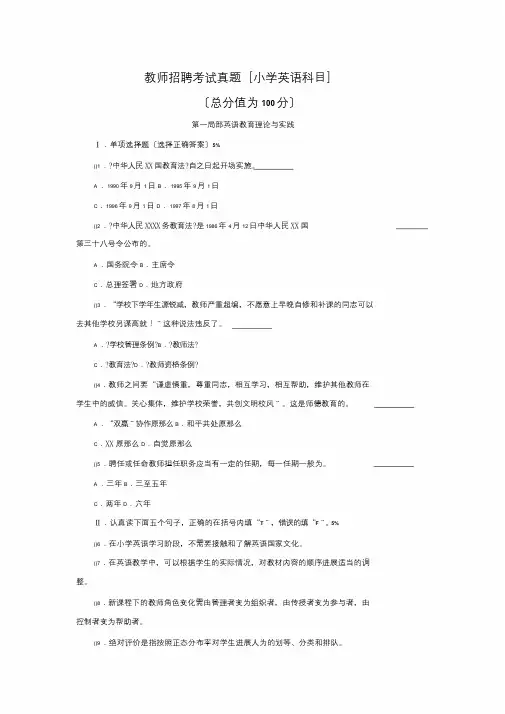
教师招聘考试真题[小学英语科目]〔总分值为100分〕第一局部英语教育理论与实践Ⅰ.单项选择题〔选择正确答案〕5%()1.?中华人民XX国教育法?自之日起开场实施。
A.1990年9月1日B.1995年9月1日C.1996年9月1日D.1997年8月1日()2.?中华人民XXXX务教育法?是1986年4月12日中华人民XX国第三十八号令公布的。
A.国务院令B.主席令C.总理签署D.地方政府()3.“学校下学年生源锐减,教师严重超编,不愿意上早晚自修和补课的同志可以去其他学校另谋高就!〞这种说法违反了。
A.?学校管理条例?B.?教师法?C.?教育法?D.?教师资格条例?()4.教师之间要“谦虚慎重,尊重同志,相互学习,相互帮助,维护其他教师在学生中的威信。
关心集体,维护学校荣誉,共创文明校风〞。
这是师德教育的。
A.“双赢〞协作原那么B.和平共处原那么C.XX原那么D.自觉原那么()5.聘任或任命教师担任职务应当有一定的任期,每一任期一般为。
A.三年B.三至五年C.两年D.六年Ⅱ.认真读下面五个句子,正确的在括号内填“T〞,错误的填“F〞。
5%()6.在小学英语学习阶段,不需要接触和了解英语国家文化。
()7.在英语教学中,可以根据学生的实际情况,对教材内容的顺序进展适当的调整。
()8.新课程下的教师角色变化需由管理者变为组织者,由传授者变为参与者,由控制者变为帮助者。
()9.绝对评价是指按照正态分布率对学生进展人为的划等、分类和排队。
()10.教学目标的三个方面包括知识目标、经历目标、情感目标。
第二局部英语专业根底知识Ⅰ.Vocabularyandstructure15%Directions:Thereare15incompletesentencesinthe following.ForeachsentencetherearefourchoicesmarkedA,B,CandD.ChoosetheONE thatbestcompletesthesentence.()1.Thoughheisseventyyearsold,hetakesexerciseeveryday.A.PastB.aboveC.OnD.over()2.—Whichwouldyoulike,Madam,teaorcoffee?—,thanks.I'dlikeaglassofwater,please.A.EitherB.BothC.NeitherD.OK()3.—Howsoonwillyoufinishthebuilding?—.A.IntwomonthsB.TwomonthsC.AbouttwomonthsD.Aftertwomonths()4.Theydidtheirfathertoldthem.A.LikeB.asC.AboutD.with()5.Oneoftheboysis,alltheotherboysare.A.English;ChinaB.anEnglish;ChineseC.England;ChinaD.English;Chinese()6.Eitheryouorhetheteam.A.isinB.areonC.isonD.arein()7.Hewasmadethirteenhoursadaybyhisboss.A.toworkB.workC.isonD.arein()8.Mrs.HuaskedLiuFangandtotakepartintheEnglishmeeting.A.IB.myC.MeD.mine()9.TellthestudentstheirEnglishbooks.A.totakeB.tocarryC.tobringD.bring()10.Itustwohourswalktogettoourschool.A.TakeB.takesC.SpendD.paid()11.Mylittlesisterissotired,shecanhardlywalk,?A.doessheB.cansheC.doesntsheD.cantshe()12.YellowRiveristhesecondlongestriverinourcountry.A./B.TheC.AnD.A()13.—Doyouwanttoatthemeeting?—No,Ihavenothingto.A.say;speakB.tell;talkC.say;sayD.speak;say()14.Sheaskedmehecoulddanceorsing.A.IfB.whatC.WhetherD.that()15.—Aren'tyouMary'ssister?—I'mheraunt.A.Yes,IamB.No,ImnotC.Yes,I'mnotD.No,IamⅡ.Close20%Directions:Thereare20blanksinthefollowingtext.Foreachblanktherearefourchoices markedA,B,CandD.ChoosetheONEthatbestfillstheblank.Duringourtwomonthsonthe road,BennettandIhadareally16experiencewithagood,honest17andsomehelpful mechanics.WeweredrivingeastonHighway10whenour“chickengine〞lightcameon.We limpedofa(n)18intoLasCruces.Wehadarealcar19.Bennettnursedthecarintoalocalgarage.Bythistimethecarwasmissing〔熄火〕so20itwasshakingallover.Thiswasthe21time toarriveatagarage—lateFridayafternoon.ServiceadviserScottwasbusy22paperworkand customersaswe23ourproblems.24hewasalready“tencarsbehind〞,hetoldustopullthecar intothegarage.Lincoln,whowelater25wasoneofthetwomotortechnicians,took26ofourcar repairing.HeandScottandsomeothermechanicsstayedseveralhoursafterclosing,27the car.Earlythenextmorning(theshopwasofficiallyclosedonSaturdays),Lincolnfinallylocatedthe28andfixediteasilywithinonly29.LaterScott30outtousthatitwasourattitudethat helped.“Youdidntcomeintotheplacedemandingthisorthat.Youshowedan31ofour problemsonabusyFridayafternoon.Customer'sattitudemeansalot.〞Hewasrightinsome way,customersshouldshow32andunderstandingtopeoplewho33them.34peoplewereextremely busy,theyfoundwaytoatleasttryandhelpwhentheyaremetwithpoliteness.Thepleasant experienceIhadshowsthat35forotherpeoplecanalwayshelp.()16.A.awfulB.pleasantC.wonderfulD.terrible()17.A.stationB.studioC.factoryD.garage()18.A.exitB.turningC.crossingD.entrance()19.A.difficultyB.examinationC.troubleD.disaster()20.A.busilyB.badlyC.quicklyD.weakly()21.A.highestB.easiestC.luckiestD.worst()22.A.atB.onC.withD.by()23.A.explainedB.introducedC.repeatedD.expressed()24.A.AsB.BecauseC.EvenD.Though()25.A.learnedB.understoodC.recognizedD.though()26.A.careB.controlC.chargeD.pride()27.A.buildingB.examiningC.repairingD.driving()28.A.problemB.diseaseC.dangerD.wound()29.A.daysB.hoursC.monthsD.minutes()30.A.spokeB.pointedC.brokeD.blew()31.A.understandingB.ignoranceC.appreciationD.awareness()32.A.cruelnessB.fairnessC.calmnessD.politeness()33.A.comfortB.protectC.serveD.rescue()34.A.EvenifB.EvenasC.EvensoD.Eventhen()35.A.obedienceB.respectC.patienceD.mercyⅢ.Readingcomprehension15%Directions:Therearethreepassagesinthefollowing.Foreachofthemtherearefour choicesmarkedA,B,C,andD.Youshoulddecideonthebestchoice.Passage1 JoeBiggswasabutcher.Hisshopwasinavillageinoneofthemostbeautifulpartsof southernEngland.Heworkedinitformanyyearswhilehisfatherwasthere.Then,whenhis fatherreachedtheageof65,hestoppedworkingintheshop.Joewasaloneinit,sohehadto workharder.Joeworkedfiveandahalfdayaweek.Hisshopshutatoneo'clockonThursday, anditwasshutthewholeofSunday.Saturdayswerethebusiestdays.Joehadabigrefrigeratorinhisshop,buthetriednottobuytoomuchmeatatatime.One Thursdayawomancameintotheshopatfiveminutestoone.“I'msorryImverylate,〞she said,“butsomepeoplehavejusttelephonedtosaythattheyaregoingtocometodinnertonight, andIneedsomemoremeat.〞Joeonlyhadonepieceofgoodmeatintheshop.Hehadsoldall therestearlierintheday.Hetookthepieceoutandsaidtothewoman.“T hisis£7.15.〞“T hat pieceistoosmall,〞thewomananswered.“H aventyougotanythingbigger?〞Joewentinto theroombehindhisshop,openedtherefrigerator,putthepieceofmeatintoit,tookitoutagain andshutthedooroftherefrigeratorwithalotofnoise.Thenhebroughtthepieceofmeatback tothewomanandsaid,“Thispieceisbiggerandmoreexpensive.It's£9.30.〞“G ood,〞the womanansweredwithasmile.“G ivemebothofthem,please.〞()36.Joeworkedaloneintheshop.A.onSaturdaysB.onThursdaysC.afterhisfatherdiedD.afterhisfatherstoppedworking()37.Joesoldmeatinhisshop.A.onThursdayafternoonsB.onSundaysC.onFridaysD.everyday()38.Onedayawomancametohisshop.A.at1:55,TuesdayB.at1:05C.tosaysorrytohimD.becausesomeonehadsuddenlytelephonedher()39.Whichofthefollowingistrue?A.Peopleboughtallthemeatfromhim.B.Thewomandidn'twanttheexpensivepieceofmeat.C.Joebroughtthewomanadifferentpiece.D.Thewomanwantedtobuythetwopiecesofmeattogether.()40.Joeonlyhadonepieceofgoodmeatbecause.A.Joesrefrigeratorhadbroken.B.hetriednottobuytoomuchmeatatatime.C.heknewthatthemeatwouldgobad.D.hehadnomoneytobuymore.Passage2 Ifyougointotheforestwithfriends,staywiththemalways.Ifyoudont,youmayget lost.Ifyoureallygetlost,thisiswhatyoushoulddo.Sitdownandstaywhereyouare.Don't trytofindyourfriends-letthemfindyoubystayinginoneplace.Thereisanotherwaytohelpyourfriendsorothernearbypeopletofindyou.Givethema signalbyshoutingorwhistlingthreetimes.Stop.Thenshoutorwhistlethreetimes.Any signalgiventhreetimesisacallforhelp.Keepuptheshoutingorwhistlingalwaysthreetimestogether.Whenpeoplehearyou,they willknowthatyouarenotjustmakingnoiseforfun.Theywillletyouknowthattheyhaveheard yoursignal.Theywillgivetwoshouts,twowhistlesortwogunshots.Whensomeonegivesa signal,itisananswertoacallforhelp.Ifyoudon'tthinkthatyouwillgethelpbeforenightcomes,trytomakealittlehousecover uptheholeswithbranchesandlotsofleaves.Makeyourselfasoftbedwithleavesand grass.Whatshouldyoudoifyougethungryorneeddrinkingwater?Youwouldhavetoleave yourlittlebranchhousetolookforariver.Don'tjustwalkaway.Pickoffsmallbranchesand dropthemasyouwalksothatyoucanfindyourwayback.Themostimportantthingtodowhenyouarelostis——stayinoneplace.()41.Ifyougetlostintheforest,youshould.A.staywhereyouareandgiveasignalthreetimesB.walkaroundtheforestandshoutsothatyourfriendsmighthearyouC.trytofindyourfriendsassoonaspossibleD.trytogetoutoftheforestandshoutforhelp()42.Ifyouwanttoletpeoplebelievethatyouarenotjustmakingnoiseforfunyou should.A.shoutthatyouarelostB.keepuptheshoutingorwhistlingalwaysthreetimestogetherC.shoutatthetopofyourvoiceD.shoutorwhistleonceinawhile()43.Whenyouhearshoutsorwhistlesorgunshots,youknowthat.A.two;peoplewillsooncometohelpyouB.three;someoneisaskingforhelpC.three;peoplewillsooncometohelpyouD.two;someoneisaskingforhelp()44.Whenyouarelostintheforest,butyouwanttoleaveyourplacetogetwater,you should.A.justgototheriverB.findabowloraglass,andthengoC.makeafiresothatyoumightmakeyourselfsomehotteaD.leavemarksasyougototheriversothatyoucanfindyourwayback()45.Thisstorymainlytellsyou.A.thatwhensomeonegivesasignalalwaysthreetimes,itisacallforhelpB.whatyoushoulddoifyougetlostintheforestC.thatwhenanysignalgiventwicemeansananswertoacallforhelpD.thatwhensomeonemakesafire,itisacallforhelpPassage3 Theoldestformsofmedicineareenjoyingacomeback.Modernholisticmedicineisan approachthattreatsthewholepatient,notjustthedisease.Itisawaytomaintaingoodhealth ratherthancureillness.Themostimportantinfluencesontoday'sholisticmedicineareancient ChinesemedicineandIndianAyurvedicmedicine,bothofwhichpromotedwholebodyhealth.Holisticmedicineusuallycombinesdiet,physicalexerciseandmeditation,togetherwithother alternativetechniquessuchasmassage〔按摩〕andacupuncture〔针灸〕.Herbaltreatment,a practiceoftreatingillnessbyusingplants,isinfluencedbythewritingsofCulpeperaswellas ChineseandAyurvedicmedicine.Homeopathy〔顺势疗法〕isoneoftheformsofholistic medicinewhichiswidelypracticedinEuropeandtheUSA.HomeopathybeganinGermanyintheearly1800s,whenSamuelHahnemanndescribedhowverytinydoses〔剂量〕ofadrughadan effectonhispatients.AccordingtoHahnemann,themorethedrugwasdiluted〔稀释〕,thestronger itseffects.Thesubstanceselectedwouldproducesimilareffectstothediseaseitselfifgivenin largedoses.IntheUKhomeopathyisregardedasanontraditionalbutjustaboutacceptable treatment.Meditationandcontemplationhaveanimportantroleinholisticmedicine.Theywere broughttoEuropebyIndianteacherswhocombinedIndianAyurvedicmedicinewithWestern beliefs.Transcendentalmeditation〔超脱静坐〕isoneofthebestknownofthese techniques.Peoplerepeatwordsinsidetheirheadtoreachastateofdeeprelaxation.Theholisticmovementhasmademanydoctorslookatthewholepatient,notjustthe disease.Lifestyle,emotionalproblemsanddietarejustsomeofthefactorsthatcanaffecta personshealth.Holisticmedicineemphasizesgooddiet,exerciseandfreshair,allofwhich contributetohealth.Someclinicsnowofferholisticmedicinealongwithtraditionaltreatments, sothattheirpatientscanchooseacombinationoftreatmentsthatsuitsthem.Oneproblemwith holisticmedicineisthatitisdifficultforpeopletobesureadoctorisreliable.Tosolvethis, manycountrieswantalternativedoctorstoformprofessionalbodies.()46.Modernholisticmedicinecentersupon.A.curingadiseaseB.herbaltreatmentC.continuousdevelopmentD.keepingpatientshealthy()47.WhichofthefollowingdoesNOTbelongtoholisticmedicine?A.MassageB.meditationC.abalanceddietD.akneeoperation()48.Theprincipleofhomeopathyisthat.A.thelargedosesofmedicinethatwillnotbeharmfulwilltakebettereffectB.thediseasewillbecuredsoonerbytakinglargerdosesofmedicineC.asmallthinnerdoseofmedicinewillbemoreeffectiveD.thedosesofmedicinedependonhowserioustheillnessis()49.Whichofthefollowingtitlesbestsumsupthepassage?A.HolisticMedicineB.TraditionalMedicineReturnsC.HistoryofMedicineD.CombinationofTreatmentsWorks()50.Whatcanweinferfromthepassage?A.Relaxationisthekeyofholistictreatment.B.Holisticmedicineneedstobecomemoretrustworthy.C.Holistictreatmentismorebeneficialthantraditionaltreatments.D.Holisticmedicinewillbecomethemostwelcometreatmentsoon.Ⅳ.Translation10%Directions:Thereare5sentencesinthefollowing.TranslatethemintoEnglish.51.我甚至在下雨天都不喜欢整天呆在家里。
(完整版)小学英语教师招聘考试专业知识
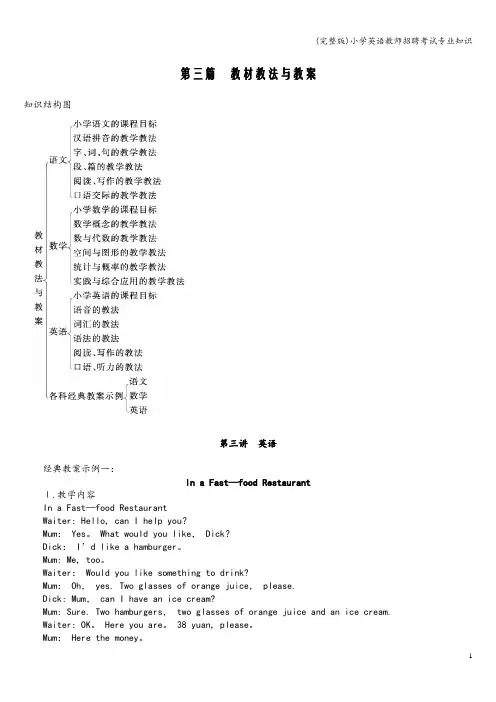
第三篇教材教法与教案知识结构图第三讲英语经典教案示例一:In a Fast—food RestaurantⅠ.教学内容In a Fast—food RestaurantWaiter: Hello, can I help you?Mum: Yes。
What would you like, Dick?Dick:I’d like a hamburger。
Mum: Me, too。
Waiter: Would you like something to drink?Mum: Oh, yes. Two glasses of orange juice, please.Dick: Mum, can I have an ice cream?Mum: Sure. Two hamburgers, two glasses of orange juice and an ice cream.Waiter: OK。
Here you are。
38 yuan, please。
Mum: Here the money。
Waiter: Thanks。
生词:fast—food restaurant hamburger句型:What would you like?Would you like something to eat/drink?Ⅱ。
教学目标1. 能听、读、说fast—food,restaurant,hamburger,并了解其含义。
2.能灵活运用重点句型,并清楚其运用的场合和语气。
(1) What would you like?(2) Would you like something to eat/drink?3.能模仿本文对话,并能在一定的语境中运用所学语言进行交际.4.培养学生的注意力和观察力,激发学生积极思维,挖掘学生运用语言的创造能力。
Ⅲ.教学重难点1.重难点句型:(1)What would you like?(2)I’d like 。
教师公开招聘考试小学英语-英语专业基础知识(一)
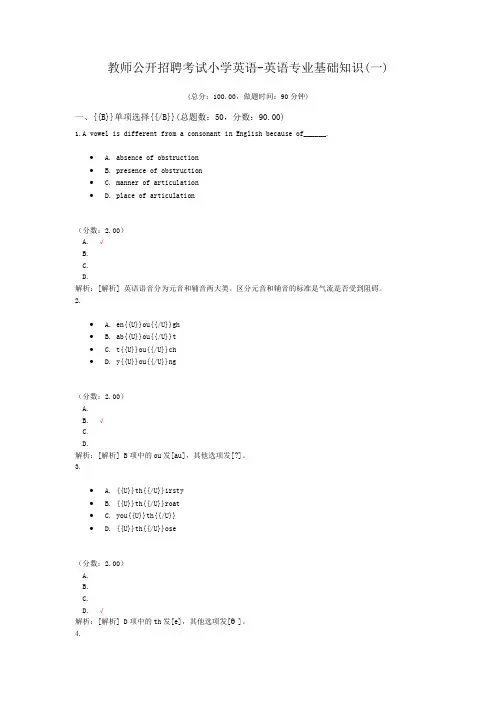
教师公开招聘考试小学英语-英语专业基础知识(一)(总分:100.00,做题时间:90分钟)一、{{B}}单项选择{{/B}}(总题数:50,分数:90.00)1.A vowel is different from a consonant in English because of______.∙ A. absence of obstruction∙ B. presence of obstruction∙ C. manner of articulation∙ D. place of articulation(分数:2.00)A. √B.C.D.解析:[解析] 英语语音分为元音和辅音两大类。
区分元音和辅音的标准是气流是否受到阻碍。
2.∙ A. en{{U}}ou{{/U}}gh∙ B. ab{{U}}ou{{/U}}t∙ C. t{{U}}ou{{/U}}ch∙ D. y{{U}}ou{{/U}}ng(分数:2.00)A.B. √C.D.解析:[解析] B项中的ou发[au],其他选项发[?]。
3.∙ A. {{U}}th{{/U}}irsty∙ B. {{U}}th{{/U}}roat∙ C. you{{U}}th{{/U}}∙ D. {{U}}th{{/U}}ose(分数:2.00)A.B.C.D. √解析:[解析] D项中的th发[e],其他选项发[θ]。
4.∙ A. sh{{U}}u{{/U}}t∙ B. c{{U}}u{{/U}}t∙ C. f{{U}}u{{/U}}nny∙ D. {{U}}u{{/U}}se(分数:2.00)A.B.C.D. √解析:[解析] D项中的u发[ju:],其他选项发[?]。
5.∙ A. thank{{U}}s{{/U}}∙ B. pill{{U}}s{{/U}}∙ C. new{{U}}s{{/U}}∙ D. film{{U}}s{{/U}}(分数:2.00)A. √B.C.D.解析:[解析] A项中的s发[s],其他选项发[z]。
历年河南中小学教师招聘考试小学英语真题及答案
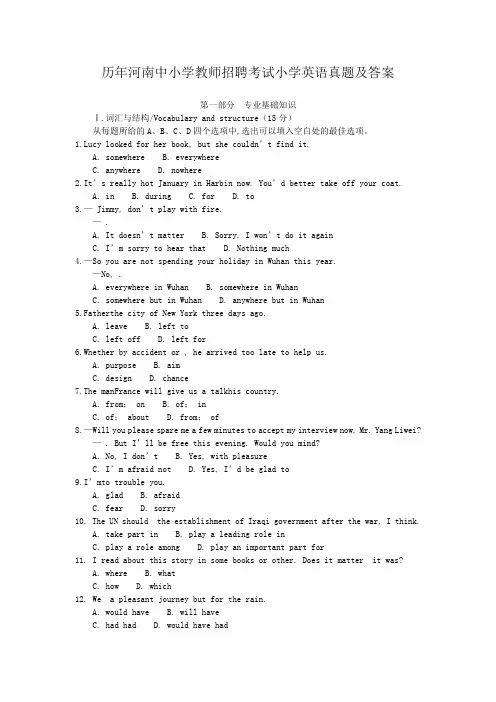
历年河南中小学教师招聘考试小学英语真题及答案第一部分专业基础知识Ⅰ.词汇与结构/Vocabulary and structure(15分)从每题所给的A、B、C、D四个选项中,选出可以填入空白处的最佳选项。
1.Lucy looked for her book, but she couldn’t find it.A. somewhereB. everywhereC. anywhereD. nowhere2.It’s really hot January in Harbin now. You’d better take off your coat.A. inB. duringC. forD. to3.— Jimmy, don’t play with fire.— .A. It doesn’t matterB. Sorry. I won’t do it againC. I’m sorry to hear thatD. Nothing much4.—So you are not spending your holiday in Wuhan this year.—No, .A. everywhere in WuhanB. somewhere in WuhanC. somewhere but in WuhanD. anywhere but in Wuhan5.Fatherthe city of New York three days ago.A. leaveB. left toC. left offD. left for6.Whether by accident or , he arrived too late to help us.A. purposeB. aimC. designD. chance7.The manFrance will give us a talkhis country.A. from; onB. of; inC. of; aboutD. from; of8.—Will you please spare me a few minutes to accept my interview now, Mr. Yang Liwei?— . But I’ll be free this evening. Would you mind?A. No, I don’tB. Yes, with pleasureC. I’m afraid notD. Yes, I’d be glad to9.I’mto trouble you.A. gladB. afraidC. fearD. sorry10. The UN should the establishment of Iraqi government after the war, I think.A. take part inB. play a leading role inC. play a role amongD. play an important part for11. I read about this story in some books or other. Does it matter it was?A. whereB. whatC. howD. which12. We a pleasant journey but for the rain.A. would haveB. will haveC. had hadD. would have had13. —Shall I sit at this end of the boat or the other end?—If you keep still, you can sit at end.A. neitherB. eachC. eitherD. any14. you don’t like him is none of my business.A. WhatB. WhoC. ThatD. Whether15. Qingdao is most beautiful coastal city and I think I’ll go there for second time.A. a; aB. the; aC. the; theD. the; /Ⅱ. 完形填空/Cloze(20分)In 1990 a report was published about what the earth might be like 20 years from then on. The report was a result of a three year 16.According to the report, the picture of the earth in the year 历年 is not a 17 one. The world will be more 18 because the population will continue to grow. The population could be 19 6300 million, almost 2150 million more than in 1985. More people would move into cities, especially cities in 20 countries. Cities like Cairo and Jakarta probably would 21 have 15 million by then.Food production will 22, but not enough to feed all the people. Farmers will grow 90% more food than they did in 1985, 23 most of the increase would be in countries that 24 produce enough food for their people. Little increase is 25 in South Asia, Africa and the Middle East. Poor farming ways are 26 large areas of crop land, changing farms into deserts. More farmland is 27 as cities become larger and more houses are built. 28 will get worse as industrial countries burn more coal and oil. Many of the world’s 29 could disappear as more and more trees are cut down. Energy will continue to be a serious problem. The experts say their picture of the earth for the year 历年 30. They only carried out the situation that 31 today. By changing the situation, by 32 the problems, the picture can be changed. There is 33 time for the nations of the world to work 34 a plan of action. But they warned that 35 too long to make decisions would greatly reduce the chances of success.16. A. learning B. projectC. noticeD. study17. A. pleased B. pleasantC. safeD. blue18. A. dangerous B. beautifulC. crowdedD. terrible19. A. no more than B. as many asC. as much asD. as large as20.A. developing B. developedC. bigD. mountainous21.A. none B. eachC. allD. neither22.A. insist B. reduceC. increaseD. continue23.A. so B. butC. orD. however24.A. already B. hardlyC. partlyD. never25.A. wanted B. lackedC. foundD. expected26.A. destroying B. protectingC. disturbingD. interrupting27.A. saved B. lostC. discoveredD. used28.A. Air pollution B. Water pollutionC. Some diseasesD. All farmland29.A. animals B. plantsC. forestsD. people30.A. must be true B. will come trueC. can’t be trueD. may be wrong31.A. happens B. developsC. existsD. appears32.A. settling B. working outC. answeringD . dealing33.A. no B. stillC. lessD. plenty of34.A. about B. inC. outD. for35.A. working B. suggestingC. spendingD. waitingⅢ.阅读理解/Reading comprehension(40分)AWhat do you want to be when you grow up? A teacher? A doctor? How about an ice cream taster?Yes, there really is a job where you can get paid to taste ice cream. Just ask John Harrison, an “Official Taste Tester” for the past 21 years. Testing helps manufacturers to be sure of a product’s quality. During his career Harrison has been responsible for approving large quantities of the sweet ice cream —as well as for developing over 75 flavors ( 味道).Some people think that it would be easy to do this job, after all, you just have to like ice cream, right? No —there’s more to the job than that, says Harrison, who has a degree in chemistry. He points out that a dairy or food science degree would be v ery useful to someone wanting a career in this “cool” field.In a typical morning on the job, Harrison tastes and assesses 60 ice cream samples. He lets the ice cream warm up to about 12℉. Harrison explains, “You get more flavor from warmer ice cream, which is why some kids like to stir it, creating ice cream so up.”While the ice cream warms up, Harrison looks over the samples and grades each one on its appearance. “Tasting begins with the eyes,” he explains. He checks to see if the ice cream i s attractive and asks himself, “Does the product have the color expected from that flavor?” Next it’s time to taste!Continuing to think up new ideas, try out new flavors, and test samples from so many kinds of ice cream each day keeps Harrison busy but happy —working at one cool job.36. What is John Harrison’s job?A. An official.B. An ice cream taster.C. A chemist.D. An ice cream manufacturer.37. According to John Harrison, to be qualified in the “cool field”, it is helpful to .A. keep a diary of workB. have a degree in related subjectsC. have new ideas every dayD. find out new flavors each day38. What does Harrison do first when testing ice cream?A. He stirs the ice cream.B. He examines the color of the ice cream.C. He tastes the flavor of the ice cream.D. He lets the ice cream warm up.39. Which of the following is probably the best title of the passage?A. Tasting with Eyes.B. Flavors of Ice Cream.C. John Harrison’s Life.D. One Cool Job.BIn June, 2007, a group of students from eight high schools in Winnipeg, the capital of Canada’s Manitoba province, will begin test launching ( 试发射) a satellite the size of a Rubik’s cube.The one kilogram Win Cube satellite, named for its home city and its shape, will be put into low orbit. Once in space, it can perform for a few months or up to several years, communicating information that could help find the signs of earthquakes.There are 80 similar satellite projects worldwide, but this is the first high school based program of its kind in Canada. 30 Manitoba high school students are having a hand in designing and building the satellite, in cooperation with aerospace ( 航空航天的) experts and 10 students from the University of Manitoba, and with support from two other organizations.The Win Cube project is not something that goes on a piece of paper; it is the real world engineering, allowing high school students to have an opportunity to learn more about the exciting world of engineering through their participation in this challenging program. It is also taken as a wonderful example of the unique partnerships within Manitoba. Designing, building and launching a satellite with high school participation will bring this world class educational project into reality and Manitoba closer to space.“These Manitoba high school students deserve congratulations for their enthusiasm, innovation ( 创新), and a strong love for discovery,” said Education, Citizenship and Youth Minister Peter Bjomson. “We want to make science more relevant ( 相关的), interesting and attractive to high school students by showing them how classroom studies can relate to practical experience in the workplace or, in this case, in space,” Bjomson added.The Win Cube program is mainly named at inspiring a strong desire for discovery on the part of the students. It also shows Manitoba’s devotion to research and innovation and the development of a skilled workforce—all important drivers of knowledge based economic growth.40. According to the passage, the Win Cube satellite is .A. named after Manitoba and its shapeB. intended for international communicationC. designed like a Rubik’s cube both in shape and sizeD. challenged by university students around the world41. According to Mr. Bjomson, .A. those Manitoba high school students are worth praisingB. the study of space can be practically made in classroomsC. Manitoba high schools are famous for the study of spaceD. scientific research is too far away from high school students42. The primary purpose of the project is to.A. find the early signs of earthquakesB. relate studies to practiceC. help high school students study the real world engineeringD. inspire a strong desire for discovery among the students43. The best title for this passage may be .A. Manitoba SchoolB. Win Cube ProgramC. Space CooperationD. Satellite LaunchingCTwo farmers were on their way home one evening after a hard day’s work. Both were tired. They happened to look up at the sky and saw a black cloud overhead.“Ah!” said one farmer, “tomorrow we shall have rain and the rice will grow well.” The second answered, “Nonsense, the rain will only kill the crops.”So they began to quarrel. Just then a third farmer came along and asked them why they were quarreling. Both farmers explained about the black cloud.“What cloud?” asked the third farmer. They all looked at the sky. The cloud was no longer there.44. The two farmers were .A. going homeB. going to the fieldC. going to workD. going to see their friend45. The two farmers on that day.A. had a holidayB. didn’t workC. worked hardD. wanted to quarrel with each other46. When there are black block clouds in the sky, .A. it will rain soonB. it will be fineC. it will get hotD. the sun is shining brightly47. The two farmers fought in words because .A. they were hungryB. it rainedC. one said the rain would do good to the crops and the other didn’t think soD. they both hoped for rainDAfter too long on the Net, even a phone call can be a shock. My boyfriend’s Liverpudlian accent suddenly becomes too difficult to understand after his clear words on screen; a secretary’s tone seems more rejecting than I’d imagined it would be. Time itself becomes fluid—hours becomes minutes, and alternately seconds stretch into days. Week ends, once a highlight of my week, are now just two ordinary days.For the last three years, since I stopped working as a producer for Charlie Rose, I have done much of my work as a telecommuter. I submit( 提交) articles and edit them by E mail and communicate with colleagues on Internet mailing lists. My boyfriend lives in England, so much of our relationship is computer mediated. If I desired, I could stay inside for weeks without wanting anything. I can order food, and manage my money, love and work. In fact, at times I have spent as long as three weeks alone at home, going out only to get mails and buy newspapers and groceries.I watched most of the blizzard of 96 on TV.But after a while, life itself begins to feel unreal. I start to feel as though I’ve merged( 融合) with my machines, taking data in, spitting them back out, just another node( 波节) on the Net. Others on line report the same symptoms( 症状). We start to strongly dislike the outside forms of socializing. It’s like attending an A. A. meeting in a bar with everyone holding a half sipped drink. We have become the Net opponents’ worst nightmare.What first seemed like a luxury, crawling from bed to computer, not worrying about hair, and clothes and face, has becomes avoidance( 逃避), a lack of discipline. And once you start replacing real human contact with cyber interaction, coming back out of the cave can be quite difficult.At times, I turn on the television and just leave it to chatter in the background, something that I’d never done previously. The voices of the programs relax me, but then I’m jarred by the commercials. I find myself sucked in by soap operas, or needing to keep up with the latest news and the weather. “Dateline”, “Frontline”, “Nightline”, CNN, New York 1, every possible angle of every story over and over, and over, even when they are of no possible use to me. Work moves from foreground to background.48. Compared to the clear words of her boyfriend on screen, his accent becomes .A. unrealB. unbearableC. misleadingD. not understandable49. What does the last paragraph mean?A. Having worked on the computer for too long, she became a bit strange.B. She is so interested in TV programs that she often forgets her work.C. She watches TV a lot in order to keep up with the latest news and the weather.D. She turns on TV now and then in order to get some comfort from TV program.50. What is the author’s attitude to the computer?A. At first she likes it but later becomes tired of it.B. She likes it because it is very convenient.C. She dislikes it because TV is more attractive.D. She dislikes it because it cuts off her relation with the outside world.51. The underlined phrase “coming back out of cave” probably means .A. going back to the dreaming worldB. coming back home from the outside worldC. bringing back direct humanD. getting away from living a strange lifeESome people make you feel comfortable when they are around. You spend an hour with them and feel as if you have known them half your life. These people have something in common. And once we know what it is, we can try to do it ourselves. How is it done? Here are several skills that good talkers have. If you follow the skills, they’ll help you put people at their ease, and make friends with them quickly.First of all, good talkers ask questions. Almost anyone, no matter how shy he is, will answer a question. One well known businesswoman says, “At business lunches, I always ask people what they did that morning. It’s a common question, but it will get th ings going.” From there you can move on to other matters—sometimes to really personal questions. And how he answers will let you know how far you can go.Second, once good talkers have asked questions, they listen to the answers. This point seems clear, but it isn’t. Your questions should have a point and help to tell what sort of person you are talking to. And to find out, you really have to listen carefully and attentively.Real listening at least means some things. First it means not to change the subject of conversation. If someone sticks to one topic, you can take it as a fact that he’s really interested in it. Real listening also means not just listening to words, but to tones of voice. If the voice sounds dull, then, it’s time for you to change the subject.Finally, good talkers know well how to deal with the occasion of parting. If you’re saying good bye, you may give him a firm handshake and say, “I’ve really enjoyed meeting you.” If you want to see that person again, don’t keep it a secret. Let people know what you feel, and they may walk away feeling as if they’ve known you half their life.52. Asking questions might be a quite good and suitable way .A. for you to make more and more new friendsB. to begin your business talksC. to get the conversation going smoothlyD. for you to make a deep and lasting impression on others53. After having asked somebody a question, it’ll be polite of you to .A. make clear what kind of person he isB. listen to his reply attentivelyC. wait quietly and patiently for his answerD. go on asking him more questions54. Generally speaking, good talkers are persons who .A. are good at making any topic interestingB. never talk too much or too littleC. always speak in a gentle wayD. know how and when they should change the topic of the talk55. If you really take delight in meeting someone again, .A. you may take him as your lifelong trustworthy friendB. it seems necessary for you to let him know itC. it’s proper for you to give him a second handshakeD. it’ll be helpful for you to have further understanding of himⅣ.选词填空/Choose the right words in proper form to fill in the blanks(10分) A. contents B. taking C. carefully D. plastic E. packaging F. declined G. similar H. typical I. contracts J. registeredHer package looks pretty, people will buy just about anything. So says an advertising executive in New York, and he has proved his point by selling boxes of rubbish for the price of an expensive bottle of wine.Justin Gignac, 26, has sold almost 900 56 presented plastic boxes of rubbish from the street of the Big Apple at between $50 and $100 each. Buyers from 19 countries have paid for the souvenirs( 纪念品). The idea has been so successful that he is thinking of promoting it around the world.It all began when Mr. Gignac was at a summer workshop. “W e had a discussion about he importance of 57,” he recalls. “Someone said packaging was unimportant.I disagreed. The only way to prove it was by selling something nobody would ever want.”He searches the streets of Manhattan and typical 58 include broken glass, subway tickets, Starbucks cups and used 59 forks. “Special editions” are offered at a high price. He charged $100 for rubbish from the opening day of the New York Yankees’ stadium.Mr. Gignac denies 60 his customers for fools: “They know what they’re getting. They appreciate the fact that they’re taking something nobody would want and finding beauty in it.”Some 61 customers include people who used to live in the city and want a down to earth souvenir. He claims he has even sold to art collectors.Realizing that the concept appears to be a real moneymaker, Mr. Gignac has 62 a company and is employing his girlfriend as vice president. He 63 to discuss his profit margins: “It’s actually quite a lot of effort putting them together—but yet, garbage is free.”Mr. Gignac is considering more varieties of souvenirs. He maintains that he hassigned 64 with people interested in 65 projects from as far as Berlin and London.Ⅴ. 补全对话/ Complete the dialogue( 10分)Mary: Hello. Is Linda there?Linda: Hello, Mary.(66)is Linda.Mary: Will you go shopping with me tomorrow?Linda: Sorry. It’s not a very good (67). Could you speak more(68), please? Mary: Sure. I said, will you go shopping with me tomorrow? I want to buy a pair of glasses.Linda: Sorry,I have to( 69)for the exam.Mary: It doesn’t( 70),we can go shopping next time.Linda: That’s very kind of you to say so.See you.Mary: See you.Ⅵ. 书面表达/Writing ( 15分)请以“My English Teacher”为题,写一篇短文。
小学英语教师招聘考试专业知识归纳
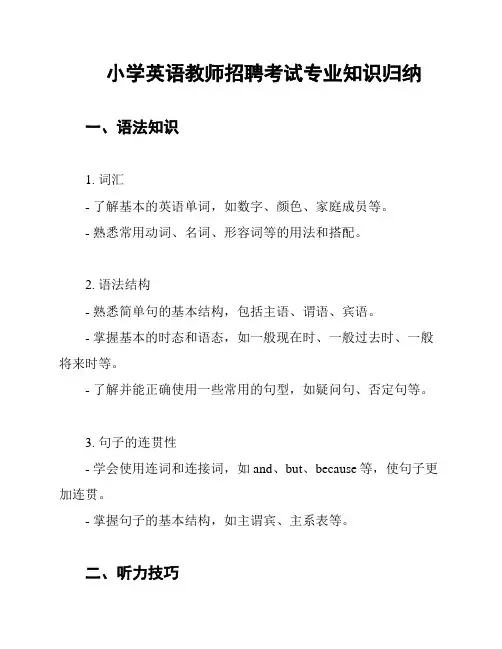
小学英语教师招聘考试专业知识归纳
一、语法知识
1. 词汇
- 了解基本的英语单词,如数字、颜色、家庭成员等。
- 熟悉常用动词、名词、形容词等的用法和搭配。
2. 语法结构
- 熟悉简单句的基本结构,包括主语、谓语、宾语。
- 掌握基本的时态和语态,如一般现在时、一般过去时、一般将来时等。
- 了解并能正确使用一些常用的句型,如疑问句、否定句等。
3. 句子的连贯性
- 学会使用连词和连接词,如and、but、because等,使句子更加连贯。
- 掌握句子的基本结构,如主谓宾、主系表等。
二、听力技巧
1. 听懂基本的日常英语对话,如问候、介绍自己、询问他人情
况等。
2. 培养听力理解能力,可以通过听录音、看英语电影等方式进
行练。
3. 注意细节和关键词,帮助理解整个对话的内容。
三、口语表达
1. 提高口语表达能力,包括语音语调、正确发音等。
2. 学会运用简单的日常用语,如问路、购物、点餐等。
3. 练日常情景对话,增加口语流利度和表达自如的能力。
四、阅读理解
1. 阅读简单的英语短文,理解文章的主题和大意。
2. 提高阅读速度和准确度,通过不断阅读来增加词汇量和语感。
3. 注意上下文的关联,理解词语和句子之间的逻辑关系。
五、写作技巧
1. 学会书写基本的英文字母和单词,保持字迹清晰。
2. 练写作简单的句子和段落,如日记、介绍自己等。
3. 锻炼写作思维,提高表达清晰、逻辑性强的能力。
以上是小学英语教师招聘考试的专业知识归纳,希望对您的备考有所帮助!。
小学英语教师招聘考试内容
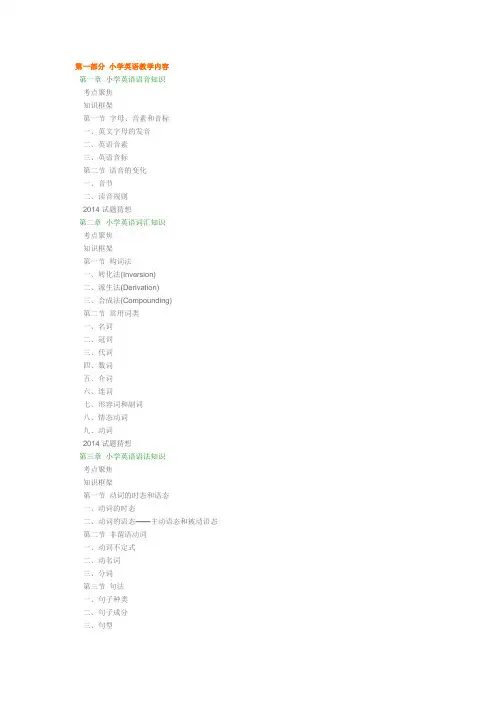
第一部分小学英语教学内容第一章小学英语语音知识考点聚焦知识框架第一节字母、音素和音标一、英文字母的发音二、英语音素三、英语音标第二节语音的变化一、音节二、读音规则2014试题猜想第二章小学英语词汇知识考点聚焦知识框架第一节构词法一、转化法(Inversion)二、派生法(Derivation)三、合成法(Compounding)第二节常用词类一、名词二、冠词三、代词四、数词五、介词六、连词七、形容词和副词八、情态动词九、动词2014试题猜想第三章小学英语语法知识考点聚焦知识框架第一节动词的时态和语态一、动词的时态二、动词的语态——主动语态和被动语态第二节非谓语动词一、动词不定式二、动名词三、分词第三节句法一、句子种类二、句子成分三、句型第四节主谓一致一、语法一致二、意义一致三、就近原则第五节虚拟语气一、动词的四种语气二、虚拟语气第六节直接引语和间接引语一、需要注意的几种变化二、直接引语改为间接引语的运用(如何变句型)三、直接引语变为间接引语时需注意的几个问题2014试题猜想第四章小学英语话题教学考点聚焦知识框架第一节利用情境进行说话教学一、让学生在生活中自觉地运用英语说话二、利用生活情境进行说话教学三、让学生在生活中寻找真实的语言环境第二节利用图画进行说话教学一、利用生活中的图画进行说话教学二、利用学生自己的图画进行说话教学三、看图说话案例附录日常生活英语话题知识第二部分高等教育对应于小学英语教学内容第一章阅读理解考点聚焦知识框架一、阅读方法技巧二、常见题型突破三、如何提高阅读理解能力2014试题猜想第二章英汉互译考点聚焦知识框架一、常用的翻译技巧和手法二、翻译的注意事项三、翻译能力的培养2014试题猜想第三章英语写作考点聚焦知识框架一、题型特点及注意事项二、写作技巧三、常见写作题型及示例2014试题猜想第四章英美概况考点聚焦知识框架一、地理位置二、历史三、政治四、文化2014试题猜想第五章英美文学考点聚焦知识框架一、英国文学二、美国文学2014试题猜想第六章语言学考点聚焦知识框架一、Phonetics and Phonology(语音学与音系学)二、Morphology(形态学)三、Syntax(句法学)四、Semantics(语义学)五、Pragmatics(语用学)2014试题猜想第三部分小学英语课程与教学论内容第一章义务教育英语新课程标准考点聚焦知识框架第一节新课程改革的背景与目标一、新课程改革的背景二、新课程改革的目标三、英语新课程改革的背景第二节课程性质、基本理念与设计思路一、课程性质二、课程基本理念三、课程设计思路第三节课程目标一、总目标二、分级目标第四节分级标准一、语言技能二、语言知识三、情感态度四、学习策略五、文化意识第五节实施要点一、教学建议二、评价建议三、教材编写建议四、课程资源开发与利用建议2014试题猜想第二章小学英语教学基础知识考点聚焦知识框架一、英语教学法流派二、小学英语常用教学法2014试题猜想第三章小学英语教学基本能力考点聚焦知识框架一、教学设计能力二、课堂教学三、学习方法指导2014试题猜想第四章小学英语教学评价考点聚焦知识框架一、评价的种类二、小学英语教学评价的理念、特殊性及评价方式三、小学英语教学评价原则四、小学英语教学评价的内容和功能六、小学英语测试的设计与评价能力附录教学设计经典范例中公教育·教师招聘笔试面授课程中公教育·教师招聘面试面授课程中公教育·全国分校一览表。
小学英语教师招聘考试英语学科知识
小学英语教师招聘考试英语学科知识标题:小学英语教师招聘考试英语学科知识一、引言在小学教育中,英语学科知识的掌握对于英语教师来说至关重要。
在招聘小学英语教师时,考察其英语学科知识也是必要环节。
本文将探讨如何在招聘考试中考察小学英语教师的英语学科知识。
二、语言知识作为小学英语教师,掌握基本的语言知识是必要的。
在招聘考试中,可以考察以下几个方面:1、语音知识:教师应能够正确发音单词和句子,掌握音节划分和重音规则。
2、语法知识:教师应熟悉句子的结构、时态、语态和主谓一致等基本语法规则。
3、词汇知识:教师需要掌握一定数量的常用词汇,能够理解并运用这些词汇进行日常教学。
三、语言技能除了语言知识,英语教师还需要具备良好的语言技能,包括听、说、读、写和译。
在招聘考试中,可以考察以下方面:1、听力技能:教师需要能够听懂基本的英语会话,能够理解并回答相关问题。
2、口语技能:教师需要能够清晰、流利地说英语,能够进行基本的课堂交流。
3、阅读技能:教师需要能够阅读和理解不同难度的英语文章,能够将其主要内容传达给学生。
4、写作技能:教师需要能够用英语书写简单、通顺的句子和段落,能够写教案和教学反思。
5、翻译技能:教师需要能够进行基本的英汉互译,能够将复杂句子准确翻译成中文。
四、教学知识在招聘考试中,还需要考察教师的教学知识,包括以下几个方面:1、教学设计:教师需要能够根据课程目标和教材内容设计有趣、实用的教学活动。
2、教学方法:教师需要了解不同的教学方法和策略,能够根据学生的年龄和特点选择合适的方法。
3、教学评估:教师需要能够评估学生的学习成果,能够制定科学的评估标准和方法。
五、结语招聘小学英语教师时,需要全面考察其英语学科知识、语言技能和教学知识。
只有具备这些能力的教师才能够在小学英语教育中发挥出色,提高教学质量,帮助学生更好地掌握英语语言。
小学英语教师招聘考试小学英语教师招聘考试在当今全球化的时代,英语已成为一门国际通用语言,是孩子们未来成功的重要技能之一。
教师招聘考试中小学英语教材教法题库(含答案)
教师招聘考试中小学英语教材教法题库(含答案)教师招聘考试中小学英语教材教法(一)一.外语教育学是:1.适应社会发展的需要2.适应提高全民族素质的需要3.适应教育改革的需要4.适应学科教育发展的需要早在十七世纪,捷克教育家夸美纽斯和十八世纪末德国教育家赫尔巴特他们的教育理论就奠定了学科教学研究的基础.二.什么是外语教育学?外语教育学是一门新的应用性的边缘教育科学(新的科学,应用性科学,边缘性科学和教育科学)/(教学过程四个阶段:明了,联想,系统,方法.)外语教育学研究的视角是多方面,多层次,多元化的.它不是取代外语教学法和普通教育学,而是教育科学与外语教学相结合而产生的中间层次的科学.具有跨学科的特点.外语教育学主要是研究课程论,学习论,教学论,评价理论,情景和科研理论等几个方面及其应用.什么是外语教育学的研究对象?外语教育学的对象主要是研究外语教育学的现象,规律,原理和方法,揭示外语教学与教育之间的联系,包括外语教学目的的标准化,教学内容的科学化,教学过程的最优化,教学方法的多样化和教学组织形式的合理化以及教师和学生协作化等.三.勃鲁姆弗脱的理论模式中人的理论由三个方面组成:1.社会学.2.语言学.3.心理学.教学课程的理论模式由相互联系的情景,课程和师生三个因素组成.外语教育学的理论模式的核心,是中观的外语教育学的理论与应研究.它包含有辩证统一的六个重要因素:课程论,学习论,教学论,评价理论,科研理论和环境.另一角度看包含课程设计者,学生,教师,评估人员四个因素.四.语言教育(第二语言教育)有三个主要源泉:1.语言描写.2.语言学习论.3.语用论.外语教育学可分三个层次:1.宏观的相关学科作为基础2.中观的外语教育学理论与应用作为体系3.微观的外语教学法和外语教学实践作为源泉外语直接法在课程标准中取得主导地位的原因有三:1.受英美的语言家和外语直接法理论影响2.在我国出现一批直接教学法的外语教学法专家,介绍推广直接法,编写了许多直接教学法的专著和教材3.参加制定课程标准的一些专家本身就是直接法的倡导者五、1.现代外语教学是一个多元化,多维度,多层次的体系2.现代外语教学法指的是研究外语教学的指导思想,性质原理,目的原则,大纲教材,师生,评价和过程的方法.(师生关系,教学方法,方式,评价手段)3.根据哲学原理,现代外语教学法流派可分为:(1)理性主义.(2)经验主义.(3)经验理性主义. 根据教育学原理,可分为:(1)演绎法.(2)归纳法.(3)演绎归纳法.根据心理学原理,可分为:(1)认知规则的理论说.(2)刺激-反应形成习惯说.(3)认知-习惯说(或习惯-认知说)根据语言学原理,可人为:(1)语言是规则的体系.(2)语言是习惯的体系.(3)语言是习惯-规则的体系.培养他们的外语教育能力,就是指导自己的外语教育实践,提高外语教育质量.综合哲学,教育学,心理学语言说的三种类别,现代外语教学法流派可分为三大类:1.理性-规则体系2.经验-习惯体系3.习惯-认知体系外语教育学的缺陷:1.结构模式单一.(单纯操作性的模式:教师-教材-教法,重经验,轻理论.重教,轻学.重方法技巧,轻创造能力)2.理论薄弱.3.研究领域狭窄.2015教师招聘考试中小学英语教材教法(二)【现代外语教学法主要流派】(考核重点)外语教学法有:1.语法翻译法(翻译法,阅读法)2.直接法(改革法,自然法)3.自觉比较法(比较法,翻译比较法)4.听说法(口语法,句型法,军队教学法)5.视听法(情影性,最初叫:整体结构法)6.认知法(认知-符号法,现代的语法翻译法)7.自觉实践法8.功能法(功能-意念法,交际法)9.习得,监控理论的自然法.一.语法翻译法:是用母语翻译教授外语书面语的一种方法.目的在于培养学生通过翻译阅读原著和能过复杂的语法讲解和操练发展学生的智慧.逐词翻译是语法翻译法的教学基础,官能心理学是语法翻译法的心理学基础.教育学的演绎法成了语法翻译法的理解语法的基本方法.语法翻译法的基本特点:1.双重教学目的(培养学生通过翻译阅读原著的能力和磨炼学生智慧)2.翻译是教学的基本手段3.教学以语法为纲4.语法材料的安排是先语法后课文语法翻译法的优点:1.适度的翻译有利于外语教学2.重视通过大量阅读,背诵原著培养阅读能力3.注意利用语法,启发思维,训练智慧语法翻译法的缺点:1.过多利用翻译主要有两个弊病:一是占用大量教学时间,直接影响运用外语进行外语教学的实践机会,二是不利于培养学生不通过翻译为中介直接用外语理解和表达思想的能力.2.过分偏重阅读能力的培养,忽视听说能力的培养.3.重形式语法教学,轻技能训练和运用语言能力的培养.4.语法与课文脱节.二.直接法:通过用外语本身进行会话,交谈和阅读外语,而不用母语,翻译和形式语法,第一批词通过指示实物,图画或演示动作等办法来讲授.(直接法对翻译法进行针锋相对的抨击,提出相对立的主张.) 外语教学应使外语与客观事物直接联系以有声语言口语为基础.模仿为主的心理学为理论基础.类推原则成了直接法模仿操练的语言学的理论基础.帕格:直觉是获得知识的唯一源泉.温特:在语言行为的心理活动中起主导作用的不是思维,而是感觉.直接法的基本特点:1. 排除以母语为中介,外语与客观事物建立直接联系.2. 不学形式语法3. 先用耳听口说,后用眼看手写.外语教学主张有志语言是第一性的,书面语言是第二性的.4. 句子为教学的基本单位.5. 模仿操练形成习惯直接法的优点:1. 重视用外语教学外语和用实物,图画,手势,动作等直观手段进行外语教学.2. 重视语言实践操练和听说读写能力的培养.3. 重视语音,语调和口语的教学4. 重视模仿5. 句子是外语教学的基本单位直接法的缺点:1. 忽视母语的中介作用.母语可以用来讲解一些较抽象的语言知识.2. 忽视语法的监控和指导作用.3. 片面重视口语能力的培养.(忽视在口语基础上加强读写能力的培养)4. 语言材料安排缺乏科学的顺序.(有时一次出现难点太多,过于集中,学生不易掌握)三.自觉对比法: 是指学生通过分析,对比外语与母语的语法结构达到自觉理解语言材料理的一种方法. 它是继承和发展了语法翻译法特点.自觉原则成了自觉对比法的重要的教育学理论基础,生理学家巴甫洛夫的两种信号学说是自觉对比法的另一个心理学理论基础.系统的外语知识在外语教学中起主导作用.母语与外语相互翻译和对比是自觉理解和掌握外语的根本手段,是学生自觉学习外语的基础. 书面语是外语教学的基础,阅读是外语教学的主要的和最重要的手段,视觉感知外语是最可靠的感知,是外语教学的出发点.自觉对比法的特点:1. 依靠母语进行翻译和对比(唯一特殊性原则)2. 语言规则指导语言实践3. 在分析\理解语言知识基础上模仿4. 在书面语基础上进行口语教学5. 由分析到综合(语音一词汇一句子一课文)自觉对比法的优点:1. 重视外语教学的思想教育性2. 重视培养学生的阅读能力3. 重视自觉性原则4. 外语与母语翻译对比,有助于编写出教材,发挥母语的正迁移作用.5. 掌握语法规则有助于掌握外语自觉对比法的缺点:1. 学生难以掌握听,说,读,写能力以进行交际2. 过分重视思想教育,而忽视了外语教学的规律性.3. 过分地强调翻译,对比和讲解语法。
小学英语教师招聘考试 英语学科知识
第一部分教材教法第一章小学英语课程标准1、英语课程的性质工具性 instrumentality 人文性 humanity2、小学英语课程的基本理念1)注重素质教育,体现语言学习对学生发展的价值2)面向全体学生,关注语言学习者的不同特点和个体差异3)整体设计目标,充分考虑语言学习目标渐进性和持续性4)强调学习过程,重视语言学习的渐进性和持续性5)优化评价方式,着重评价学生的综合语言运用能力6)丰富课程资源,拓展英语学习渠道3、英语课程的设计思路:共九级,从小学三年级开始,一级为三四年级水平,二级为五六年级的目标要求,九年级结束达到五级,6年级结束达到二级P18九级 6年级2级九年级五级4、英语课程总目标:使学生形成初步的综合语言运用能力,促进心智发展,提高综合人文素养5、小学英语课程的内容标准:1)语言技能一级语言技能:听做说唱玩演读写视听,二级语言技能:听说读写,玩演视听2)语言知识语音 pronunciation词汇语法 grammar以及用于表达常见话题和功能的语言形式3)情感态度affect 兴趣动机自信意志合作精神4)学习策略P25:认知:为了完成具体的学习任务而财务的步骤和方法调控:学生对学习加以计划、实施、反思、评价和调整的行动和步骤交际:学生为了争取更多的交际机会、维持交际以及提高交际效果而采取的行动资源策略:学生合理并有效利用多种媒体进行学习和运用英语的方式和方法5)文化意识cultural understanding▲小学英语教学中,如何渗透策略的培养:反思与监控、根据学习风格调整、注重交流和相互学习、提供必要指导(题)6、教学建议:1)面向全体学生,为每个学生学习英语奠定基础2)注重语言实践,培养学生的语言运用能力3)加强学习策略指导,培养学生的自主学习能力4)培养学生跨文化交际意识,发展跨文化交际能力7、小学英语教材编写建议原则:思想性原则、科学性、趣味性、灵活性科学性原则:教材内容的编排要符合学生认知发展水平和语言习得的过程8、教材的特征(英语教材是学生学习和教师教学的重要内容和手段,使英语课程资源的核心部分)1)引发学生的好奇、兴趣和注意力make students feel at ease2)帮助学生建立自信,满足学生的需求meet students’ needs3)可以为学生提供运用目的语进行交际的机会,注重语言运用的真实性(expose students to language in authentic use)4)能够考虑到语言教学的积极影响往往会延迟以及学生之间学习风格learning style和情感态affective factors的差异。
2022年教师招聘考试考纲小学英语
1
与节奏。
词汇:理解和运用《义务教育英语课程标准(2011年版)》附录中所列1500~1600个单词。
语法:理解和运用《义务教育英语课程标准(2011年版)》中要求的词法知识和句法知识,包括:
●构词法(包括常用的前缀、后缀,常用词的转化、合成);
●词类(包括名词、代词、数词、介词和介词短语、连词、形容词、副词、冠词和动词);
●句子成分(包括主语、谓语、表语、宾语、定语、状语和宾语补足语);
●句子种类(包括陈述句、疑问句、祈使句和感叹句);●句子类型(包括简单句、并列句和主从复合句,其中主从复合句包括宾语从句、状语从句、定语从句);
●时态和语态(包括一般现在时、一般过去时、一般将来时、现在进行时、过去进行时和现在完成时;以及用于
招聘工作,把好教师“入口关”。
考试采取笔试和面试相。
- 1、下载文档前请自行甄别文档内容的完整性,平台不提供额外的编辑、内容补充、找答案等附加服务。
- 2、"仅部分预览"的文档,不可在线预览部分如存在完整性等问题,可反馈申请退款(可完整预览的文档不适用该条件!)。
- 3、如文档侵犯您的权益,请联系客服反馈,我们会尽快为您处理(人工客服工作时间:9:00-18:30)。
第一部分教材教法第一章小学英语课程标准1、英语课程的性质工具性 instrumentality 人文性 humanity2、小学英语课程的基本理念1)注重素质教育,体现语言学习对学生发展的价值2)面向全体学生,关注语言学习者的不同特点和个体差异3)整体设计目标,充分考虑语言学习目标渐进性和持续性4)强调学习过程,重视语言学习的渐进性和持续性5)优化评价方式,着重评价学生的综合语言运用能力6)丰富课程资源,拓展英语学习渠道3、英语课程的设计思路:共九级,从小学三年级开始,一级为三四年级水平,二级为五六年级的目标要求,九年级结束达到五级,6年级结束达到二级P18九级 6年级2级九年级五级4、英语课程总目标:使学生形成初步的综合语言运用能力,促进心智发展,提高综合人文素养5、小学英语课程的内容标准:1)语言技能一级语言技能:听做说唱玩演读写视听,二级语言技能:听说读写,玩演视听2)语言知识语音 pronunciation词汇语法 grammar以及用于表达常见话题和功能的语言形式3)情感态度affect 兴趣动机自信意志合作精神4)学习策略P25:认知:为了完成具体的学习任务而财务的步骤和方法调控:学生对学习加以计划、实施、反思、评价和调整的行动和步骤交际:学生为了争取更多的交际机会、维持交际以及提高交际效果而采取的行动资源策略:学生合理并有效利用多种媒体进行学习和运用英语的方式和方法5)文化意识cultural understanding▲小学英语教学中,如何渗透策略的培养:反思与监控、根据学习风格调整、注重交流和相互学习、提供必要指导(题)6、教学建议:1)面向全体学生,为每个学生学习英语奠定基础2)注重语言实践,培养学生的语言运用能力3)加强学习策略指导,培养学生的自主学习能力4)培养学生跨文化交际意识,发展跨文化交际能力7、小学英语教材编写建议原则:思想性原则、科学性、趣味性、灵活性科学性原则:教材内容的编排要符合学生认知发展水平和语言习得的过程8、教材的特征(英语教材是学生学习和教师教学的重要内容和手段,使英语课程资源的核心部分)1)引发学生的好奇、兴趣和注意力make students feel at ease2)帮助学生建立自信,满足学生的需求meet students’ needs3)可以为学生提供运用目的语进行交际的机会,注重语言运用的真实性(expose students to language in authentic use)4)能够考虑到语言教学的积极影响往往会延迟以及学生之间学习风格learning style和情感态affective factors的差异。
5)能够有利于学生多元智能的发展,最大限度的发挥学习潜能 maximize learning potencial8、教材的结构:话题(主线)功能结构任务9、教材的功能P31:国家课程标准的具体化,是教与学的主要凭借,是学生获取知识的主要源头10、教材的使用建议:1)对教材内容进行适当的补充和删减 2)替换教学内容和活动 3)扩展教学内容或活动步骤4)调整教学顺序 5)调整教学方法 6)总结教材使用情况11、课程资源的开发与利用:开发利用教材资源、学校资源、网络、学生第二章小学英语教学基础知识1、语言的特征:任意性Arbitrary,双重性duality,创造性creativity,文化的移入性cultural transmission,移位性displacement(掌握概括generalizations 和抽象能力abstractions)2、语言的功能:信息功能informative、人际功能interpersonal、施为功能performative、情感功能emotive、寒暄功能phatic communication、娱乐功能recreational、元语言功能Metalingual function3、语言观:结构语言观:语言学习本身是一种操练活动功能语言观:如何用语法规则和词汇来表达概念并执行功能交互语言观:international(强调交互性interaction和动态dynamics)4、语言学习理论1)行为主义学习理论Behavioral learning theory,语言不是先天具有而是后天习得,刺激-强化-反应2)认知主义学习理论Cognitive learning theory,观察、发现,学习者重新组织认知结构的过程3)建构主义学习理论Constructivist learning theory,39(最近发展区ZPD:Zone of proximal development)5、多元智能理论1.语言智力linguistic intelligence 2、数理智力Logical-Mathematical intelligence3.肢体运动智力Limb motor intelligence 4.音乐智力musical 5.视觉空间智力spatial6、人际交往智力 inerpersonal 7.内省智力intrapersonal 8.自然智力naturalistic6、教学观(小学英语教学方法):1)语法翻译法grammar translation method,母语2)直接法direct method外语本身,强调模仿3)听说法Audio-Lingual Method,刺激-反应,句型操练,先听说,后读写,有错必纠4)认知法cognitive approach,反对机械练习,注重创造性思维,提倡演绎法和讲授法,转换生成语法5)交际法communicative approach过程全方位接触语言-交际活动-自由表达-交流思想 3P presentation practice production6)全身反应教学法total physical response method(TPR,45),基础是行为主义学习理论,优点,(儿童习得母语的表现)▲全身反应法的内涵(优缺点P45):口头发号施令,给予指示,并辅以肢体动作示范帮助了解指令的意义,学生充分了解语句的意义后,再以肢体动作做出正确的反应。
1)一下子就抓住学生的注意力,吸引学生参加活动,让他们在身临其境的实验体验中学习英语。
教学的重点在于帮助学生理解英语、用英语交流,不在于纠正学生在学习过程中所犯的错误。
这样做有利于帮助学生消除紧张心理,让学生在一个不用害怕挫败的环境中学习。
2)它能够提供一个与实际生活紧密相连的学习环境,使学生在多种多样的活动中、在循环反复的练习中学会英语。
3)主张以句子为教学单位,整句学、整句用,重视语言内容和意义,有利于培养学生实际运用语言进行交际的能力。
7、任务型教学内涵:以具体任务为学习动力或动机,以完成任务过程为学习过程,以展示任务成果来体现教学成就的一种教学方式,理论基础是建构主义任务的概念:以真实世界为参照,以形成语言意义为主旨的活动任务的四个元素目标objective(purpose)语境context 过程process 结果outcomeArbitrary 任意的arbitrary任务教学的四个元素:目标objective 语境context 策略 strategy结果outcome任务型教学的程序(task-based):前任务pre-task 任务环task-cycle(task-planning-report)语言聚焦language focus(分析练习)8、任务型教学的优点与不足P50 在英语教学中的应用 66优点:倡导以教师为主导,学生为主体;倡导体验、实践、探索、交流、合作;注重真实场景的交际活动不足:课堂效率低,难以保证大班教学任务的完成、过分依赖教师的能力和水平,很难保证大面积教学质量的提升、课堂活动中,难以有效监督和控制学生的个体活动,反馈效率低▲组织英语教学游戏的基本要求:目的性,随教学内容改变,增加竞赛感,难度与能力相当9、语音教学的内容(teaching pronunciation):发音知识和单音教学,字母发音教学,语流教学原则:隐形原则、示范性原则、模仿性原则、整体性、可懂性方法:语流的教学、单音的教学(同中选异odd one out,填空completion,排序which order)▲词汇教学的内容(Teaching Vocabulary;):▲词汇的意义word meaning(概念意义conceptual meaning即字面意思literal meaning和关联意义associated meaning)、▲用法word use(搭配collocation,短语phrase,习语idiom,风格style,语域register)▲信息word information(词类parts of speech,词的前缀prefixes,词的后缀suffixes,词的拼写,发音,语法特征 word grammer)▲记忆策略word memory strategies(避免死记硬背 rote-learning)原则:直观性、情境性、趣味性、重复性方法:单词音义形的结合,主题认读单词、活动认读单词语法教学的内容(Teaching grammar):语法的形式结构、语意、语用原则:隐性implict、趣味性interest、意义先行meaning go first(go for meaning)、适量原则ecomomy(讲解要适时适量)呈现语法的方法:演绎法 deductive 归纳法 inductive 引导发现法 guided discovery10、听力教学▲影响听力的主要因素:客观因素(听力材料types of language used、听力任务task in listening、文化背景知识context in which the listening occurs),主观因素(心理因素、知识技能、方法与策略因素)▲基本听力能力:辨音能力discrimination,交际信息辨别能力recognizing communication signals,大意理解能力Gist listening,细节理解能力listening for specific information ,词义猜测能力Word guessing,推理判断和预测能力inferring and predicting,记笔记Note taking▲小学听力课堂训练策略:坚持用英语组织教学、因材施教、加强听力技能指导,采取多种听力练习11、口语教学:▲口语的特点 fragmentation结构的不完整性,与说话场合的紧密依存性involvement语法特征(句子简单,口语化;具有明显的口语色彩的词语,时髦语fashionable word,歇后语 two-part allegorical saying,口语词colloquialism,俚语slang,短语动词phrasal verbs结构特征(填补词remedy word)、形象特征(body language)▲口语教学技巧:营造口语表达的氛围,感知语音;采用多种口语教学活动为学生开口说英语创造条件▲小学英语口语的训练模式:机械型训练模式、交际型训练模式12、阅读教学▲小学阶段的阅读特点:从认读到阅读;阅读内容简单,形式简练;非语言输出▲阅读技巧精心渗透略读法skimming(主旨大意) 恰当运用寻读法scanning 整体阅读▲阅读能力培养:激发小学生阅读兴趣、积累sight words、鼓励自主阅读、创设丰富的展示平台,升华学生的阅读兴趣、家长的参与▲阅读教学模式:自下而上bottom-up(单词-句子-大意,解码编码过程)自上而下 top-down(预测)交互补偿interactive compensatory 交互补偿模式13、写作教学:▲小学英语写作的教学内容:字母书写、单词及短语的书写、句子的书写、语篇的书写▲写作教学原则:写作任务体现趣味性、真实性原则;要坚持整体把握、循序渐进原则;充分发挥教师的示范指导作用;坚持以学生为中心▲写作教学方法:写听结合、写说结合、写读结合▲写作教学模式:product-oriented注重结果的写作教学模式,content-oriented 内容, Process-oriented 过程第三章小学英语教学设计1、教学设计概念instructional design2、教学设计的原则:目的性aims,多样性variety,灵活性flexibility,可学行learnability, linkage衔接性,feasibility (可行性)3、教学设计新理念:学生参与课堂设计的自主性,教学设计贯穿课堂教学的全过程,教学设计的确定性与不确定性相统一4、教学设计的实施过程(前反馈,不必有错必纠)725、教学设计要素分析1)分析学习者特点2)分析教学内容(话题、语言功能、语言结构、任务活动)3)确立教学目标(教学目标的内容:知识与技能,过程与方法,情感态度与价值观)教学目标的描述方式;ABCD(audience,behavior,conditions,degree)4)确定教学的重点和难点(确定重难点的依据:教材和课程标准,学生的实际情况,教师的经验;突出重点、突破难点的方法:比喻说明法、列表对比法、练习法、多媒体辅助教学法、游戏活动法)5)设计教学步骤(warming-up revision presentation practice ending(总结和作业))6)小学英语作业设计(原则:趣味性、实践性、层次性、探究性、开放性、合作性)7)教学板书设计(提纲式板书、表格式板书、图文式、比较式。
